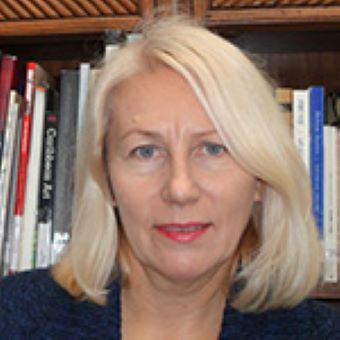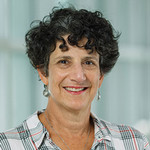Experiences in the U.S.
Aug. 4, 2014
By Amy Powell
Dr. Brygida Gasztold of Koszalin, Poland recently completed her Fulbright Fellowship at the Hadassah-Brandeis Institute. Fresh Ideas editor Amy Powell spoke to Dr. Gasztold about her experiences here.
 Q: Tell us about your Fulbright and the work you came here to do?
Q: Tell us about your Fulbright and the work you came here to do?
A: This was a great opportunity for any scholar, especially one like me who lectures in American culture and history. It was my first time in the U.S. and the hands-on experience was great. Coming to America is important and interesting for any scholar, especially in terms of meeting other scholars and discussing academic achievements. For any person who does American studies, the U.S. is the place to be and for me, a first-time visitor, it's very exciting.
Q: You are interested in Jewish-American literature. How did your Fulbright help you learn more about this?
A: The U.S. is the place where I was introduced to Jewish culture for first time in my life. I live in northern Poland and it was not historically a center of Jewish Culture. Before the Second World War, this region was part of Germany. Being here and meeting so many Jewish people and learning about their cultural institutions gave context to my studies. I am a critic so I work with text, not real life. This whole experience not just clarified my worldview, but made it more complex.
For example, I have seen how many different ways there are of being Jewish in the U.S. I went to different kinds of synagogues including Reform, modern Orthodox, and Conservative. I attended services that had tambourines and some that wouldn’t allow that.
Q: Are many people in Poland studying American Jewish modern literature?
A: It is not a big field of study, but there is growing interest in Judaism in literature and history. We are rediscovering our Jewish past. In Krakow and Warsaw, there are festivals and lectures. We can call it a revival of interest.
Q: Do you feel like you accomplished your goals during your Fulbright?
A: I set out to study modern Jewish American authors, and female characters in fiction, applying gendered lens to contemporary American Jewish fiction. I focused on Allegra Goodman, Rebecca Goldstein, Pearl Abraham, Cynthia Ozick, Tova Mirvis and Annie Roiphe. This project will be published in a book with the working title, "Stereotyped, Spirited and Embodied: Current Representations of Women in Contemporary American Jewish Fiction."
Q: What stereotypes did you study?
A: I limited my study to the time period of the 20th century to the 1970s, looking at the ghetto mother, ghetto girl, Jewish mother and Jewish American princess. Within these stereotypes, I studied spirituality, their relationship to religion, and the relationship to the female body.
Q: In addition to the research, how would you characterize your time in the U.S. at HBI?
A: By being here, I was able to take part in scholarly debate, conferences, colloquia and got to be part of the scholarly life at Brandeis. I went to many events, not only related to my field, but also went to films, art exhibition, talks on gender and culture, Israel and law. I learned so many things. It is interesting and important to be able to exchange information and ask questions, to get views and context of things I wouldn't get in Poland. I learned so much from the many experts and scholars at Brandeis. I may want to teach courses connected with American Jewish femaleness or American Jewish female writers.
Q: How do American universities differ from where you teach in Poland?
A: The most profound differences is that in Poland, students do not choose subjects. They choose a path and follow what is prescribed. I like that the classes here are smaller and more individually oriented. There is more interaction between professor and student. I also like that the students are involved in so many different extracurricular activities and sports, political and social organizations and that you can hear their opinions. The students really have free speech and voice that can criticize without penalty. It's interesting that activism is encouraged and they learned how to discuss politics. Overall, university life is so rich and it develops their character and teaches them a lot along side their academic pursuits.
 Amy Sessler Powell is HBI communications director.
Amy Sessler Powell is HBI communications director.